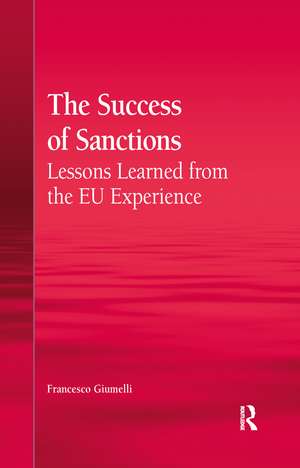The Success of Sanctions: Lessons Learned from the EU Experience
Autor Francesco Giumellien Limba Engleză Paperback – 9 dec 2019
| Toate formatele și edițiile | Preț | Express |
|---|---|---|
| Paperback (1) | 258.52 lei 6-8 săpt. | |
| Taylor & Francis – 9 dec 2019 | 258.52 lei 6-8 săpt. | |
| Hardback (1) | 767.07 lei 6-8 săpt. | |
| Taylor & Francis – 22 iul 2013 | 767.07 lei 6-8 săpt. |
Preț: 258.52 lei
Preț vechi: 310.65 lei
-17% Nou
Puncte Express: 388
Preț estimativ în valută:
49.47€ • 52.90$ • 41.25£
49.47€ • 52.90$ • 41.25£
Carte tipărită la comandă
Livrare economică 17 aprilie-01 mai
Preluare comenzi: 021 569.72.76
Specificații
ISBN-13: 9780367860462
ISBN-10: 0367860465
Pagini: 272
Dimensiuni: 156 x 234 x 15 mm
Greutate: 0.38 kg
Ediția:1
Editura: Taylor & Francis
Colecția Routledge
Locul publicării:Oxford, United Kingdom
ISBN-10: 0367860465
Pagini: 272
Dimensiuni: 156 x 234 x 15 mm
Greutate: 0.38 kg
Ediția:1
Editura: Taylor & Francis
Colecția Routledge
Locul publicării:Oxford, United Kingdom
Cuprins
1 Introduction: Measuring the Effectiveness of Sanctions PART I THE PROCESS 2 The Targeted Measures of the EU 3 An Overview of the Restrictive Measures of the EU PART II THE PRACTICE 4 The EU on the US: A Legal Use of Sanctions 5 The EU in Belarus: Sanctioning to Engage 6 The EU in Zimbabwe: Imposing Sanctions for Regime Change? 7 The EU in Transnistria: A Strategy of Divide and Influence 8 The EU in Uzbekistan: The Essence of Strategic Signalling 9 The EU and China: Pleasing Actors at Home and Abroad PART III THE LESSONS LEARNED 10 Conclusions: Sanctions as an Effective Foreign Policy Tool Appendices Appendix I: Sanctions Cases Classified According to their Logic Appendix II: Sanctions Cases Classified According to their Conflict Type Appendix III: Sanctions Cases Classified According to their Form
Notă biografică
Dr Francesco Giumelli is Assistant Professor in International Relations and European Studies at the Metropolitan University Prague, Czech Republic, and former Jean Monnet Fellow at the European University Institute, Italy.
Recenzii
’This work belongs to a new generation of sanctions studies which focusses on clearly identified episodes within a particular case. By applying this approach to six European Union sanctions, Giumelli manages to draw nine valuable lessons on their effectiveness that are likely to generate great interest for sanctions researchers and policy makers alike.’ Peter Wallensteen, Uppsala University, Sweden and University of Notre Dame, USA ’With Security Council gridlock leading to fewer UN sanctions, Giumelli provides a succinct, much needed analysis of the effectiveness of EU sanctions in advancing global norms. His scrutiny of the process and actors generating EU measures combines with a detailed analysis of various cases and a summary of lessons learned to make this an excellent contribution to the sanctions literature.’ George A. Lopez, University of Notre Dame, USA 'The author does not seek to provide readers with ready-made results but with a tool to undertake their own evaluations. The book unveils its true value as a manual on how to analyse sanctions, not as an assessment of sanctions efficacy.' Swiss Political Science Review
Descriere
In this book Francesco Giumelli measures the true effectiveness of EU sanctions against a range of states including Belarus, Zimbabwe, Moldova, Uzbekistan, the USA and China. He demonstrates that focussing purely on behavioural change is limiting, especially when considering the actions and motivation of an international organisation, and develops a process to evaluate the direct and indirect impact of EU sanctions. Giumelli demonstrates the many different ways sanctions have been used by the EU to produce positive direct and indirect results and provides a multi-level framework to assess the success of sanctions in the future.











